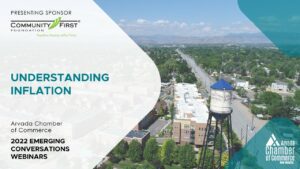 On March 18, 2022, the Arvada Chamber hosted “Understanding Inflation” as part of the Emerging Conversations Webinar series. The Arvada Chamber welcomed keynote speaker Matt Kukla, Senior Research Analyst at Syntrinsic, who provided the latest research on the pandemic’s impact on inflation and projections for the rest of 2022.
On March 18, 2022, the Arvada Chamber hosted “Understanding Inflation” as part of the Emerging Conversations Webinar series. The Arvada Chamber welcomed keynote speaker Matt Kukla, Senior Research Analyst at Syntrinsic, who provided the latest research on the pandemic’s impact on inflation and projections for the rest of 2022.
A panel discussion followed, featuring Sean Kaiser (Lodo’s Bar & Grill), Tyson Miller (CFO at Hill Petroleum), and Curtis Dubay (Economist at U.S. Chamber of Commerce). We want to thank Christine Jensen, Branch Manager at Fairway Independent Mortgage Corporation, for moderating the event. We also thank Community First Foundation for sponsoring the Emerging Conversations Webinar series.
Find a copy of the presentation here and key takeaways, a recording of the webinar, and speaker bios below.
5 Key Takeaways from “Understanding Inflation”
- “Inflation is a hidden tax that essentially reduces purchasing power requiring a trade-off in the portfolio of consumption patterns for households, businesses, and governments,” according to Matt Kukla. There are two types of inflation, Asset Price Inflation (impacting the investment economy) and Goods/Services Inflation (impacting the real economy). Goods/Services Inflation reduces purchasing power and is particularly harsh for lower-income families.
[su_spacer size=”10″] - Current inflation is at 7.9%, a 40-year high. A number of factors are leading to today’s inflation, including the fiscal stimulus, monetary stimulus, pent-up demand in spending, supply chain constraints and the rising cost of labor.
[su_spacer size=”10″] - Businesses can take a varied approach to combat inflation rates. Overall, businesses will need to decide on three scenarios: pass on costs to customers, reduce costs, or absorb costs. To reduce costs, businesses can improve productivity, automate where possible, bundle services, form group purchasing networks or simply the supply chain.
[su_spacer size=”10″] - The Fed’s targeted level of inflation is 2% in 2023. The expectation is that inflation rates will peak in the first half of 2022. High levels of inflation do not persist indefinitely, however, persistent worker shortages would prolong the current high rate.
[su_spacer size=”10″] - Today’s inflation can be compared to the immediate period after WWII. Many are comparing today’s inflation to the wage-price spiral of the 1970s, when inflation occurred as demand and output exceeded potential supply in the economy. At that time, wages rose in line with inflation. Although wages are increasing today, they are currently increasing less than the rate of inflation. The years following WWII saw the removal of price controls, supply shortages and pent-up demand, which caused prices to jump 20%. Inflation rates normalized in about a year before reaching 10% at the start of the Korean War.
Webinar Recording
Speaker Bios
[su_spoiler title=”Matthew Kukla, Senior Research Analyst: Syntrinsic” style=”fancy” icon=”chevron”]Matt Kukla joined Syntrinsic in 2022 as a Senior Research Analyst with a particular focus on private markets and alternative assets including venture capital, private equity, hedge funds, real estate, and private debt. He is responsible for researching investment managers, developing capital market expectations, and constructing client portfolios.
Prior to joining Syntrinsic, Matt has worked in a variety of roles throughout the financial spectrum including sell-side equity analysis, buy-side portfolio management, international finance, high net-worth banking, consulting, and data/analytics.
Matt graduated Magna Cum Laude from Cleveland State University with a bachelor’s degree in Finance and is a Chartered Financial Analyst (CFA) Level III Candidate. A native of Cleveland, OH, Matt spends much of his time reading literature on money, banking, finance, and economics. He also enjoys deep thinking and writing in his journals.[/su_spoiler]
[su_spoiler title=”Sean Kaiser, Lodo’s Bar & Grill” style=”fancy” icon=”chevron”]
Sean Kaiser is an award-winning, hospitality industry executive with more than 30 years of experience in restaurant operations. He is a hands-on, collaborative leader with passion and reputation for developing high-performing teams that are dedicated to the execution of world-class quality and service standards. He is dedicated to creating exceptional dining experiences by promoting high-level guest engagement and top-quality community relationships. Sean Kaiser and his wife Deborah are slated to be the primary operators of the new Legacy Point Bar & Grill (Currently operated as Lodo’s Bar & Grill) located at 3053 W 104th Ave, in Westminster, CO. He has served on the executive committee of Colorado Restaurant Association Board of Directors, the Arvada Chamber Board and is Past Chairman of the JCBEA and Westminster Chamber of Commerce, and he also chaired the steering committee for Pomona?s High School of Business Program. Sean has received numerous?Readers? Choice? awards for best local restaurant, as well as several awards for community involvement and government affairs through local business organizations, and has been recognized with Commendations from both chambers of the Colorado State legislature.[/su_spoiler]
[su_spoiler title=”Tyson Miller, CFO, Hill Petroleum” style=”fancy” icon=”chevron”]
Tyson Miller is the Chief Financial Officer for Hill Petroleum in Arvada, Colorado. This is his 4th year in this position after coming to Hill Petroleum from the government service where in his last position he managed NATO programs for the US Navy throughout Europe. Tyson is a results-driven finance and accounting executive with more than 20 years of progressive experience in finance, strategy, and operations management in small companies to multi-national organizations. He is also on the Board of Advisors for Greenfill, LLC, one of the first eco-friendly liquefied soap dispensing systems for commercial laundry services. He now resides in Fort Collins with his wife and two sons.[/su_spoiler]
[su_spoiler title=”Curtis Dubay, Economist, U.S. Chamber of Commerce” style=”fancy” icon=”chevron”]
Curtis Dubay, senior economist in the Economic Policy Division at the U.S. Chamber of Commerce, tracks the condition of the economy, analyzes the impact of public policy on economic growth, and runs the Chamber’s Chief Economists Committee. The committee consists of chief economists from member businesses. It helps the Chamber formulate economic policies and provides analysis to policymakers in Washington, D.C. Previously, Dubay was senior economist at the American Bankers Association where he worked on tax issues and followed the economic trends affecting the banking industry. Prior to ABA, he was a research fellow in tax and economic policy at The Heritage Foundation. There he researched and published on tax and economic policy issues. Earlier in his career, Dubay worked at PricewaterhouseCoopers (PwC) in the firm’s transfer pricing division structuring international transactions, and before that at the Tax Foundation where he authored three widely recognized and cited reports: Tax Freedom Day, State-Local Tax Burdens, and The State Business Tax Climate Index. Dubay has researched and published frequently on a wide range of tax and economic issues. He is regularly quoted by the press and has appeared often in the media, including on CNBC, Fox Business, Fox News, and C-SPAN. He has testified before Congress several times and been cited in newspapers such as The Wall Street Journal, The New York Times, The Washington Post, USA Today, and Politico. Dubay received his master’s degree in economics from the University of Connecticut and his bachelor’s degree in economics and leadership studies from the University of Richmond. He resides in Washington, D.C., with his wife and three sons.[/su_spoiler]
Join the Arvada Chamber in person on April 15 for the Annual State of the City Address. Register for all upcoming Arvada Chamber events at arvadachamber.org/chamber-events.



0 Comments